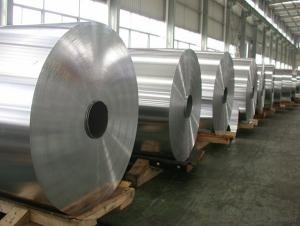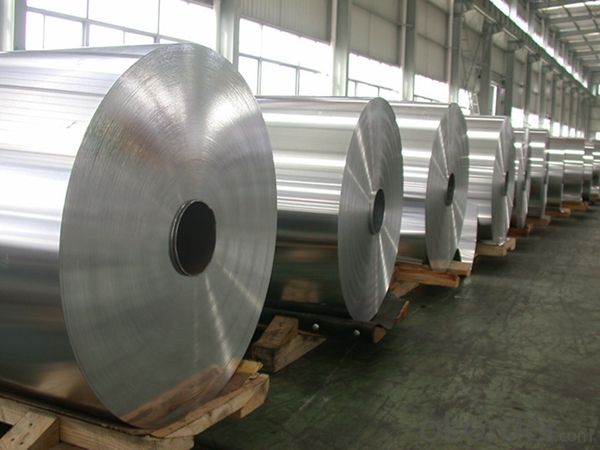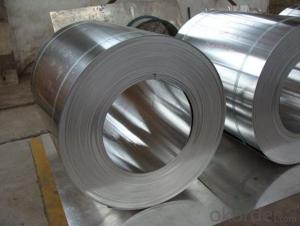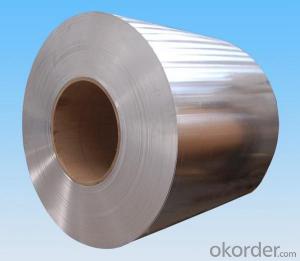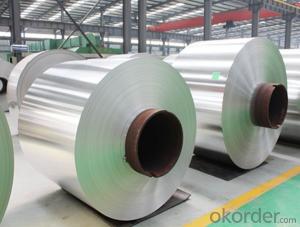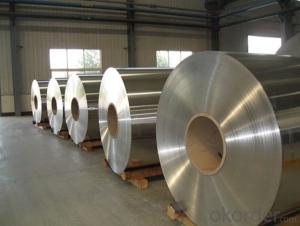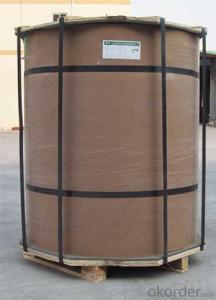Coil Coating Aluminum Factory Direct Supply Mill Finish Aluminum Coil 1050 for Building
- Loading Port:
- Shanghai
- Payment Terms:
- TT OR LC
- Min Order Qty:
- 5 m.t.
- Supply Capability:
- 10000 m.t./month
OKorder Service Pledge
OKorder Financial Service
You Might Also Like
Specification
1. Specification of Factory Direct Supply Mill Finish Aluminium Coil 1050 for Building
Name | Aluminum Coil |
Brand | CNBM |
Alloy | 1100H-18, 3003-H24,3003-H26,3005-H26,8011,3004,3105,5005,etc. |
Thickness | 0.1~1.5mm |
Width | <2000mm< span=""> |
MOQ | 1 MT |
Coating finish | Brushed, drawing, embossed, printing |
Color | As to code RAL |
Surface | Embossed,Mill Finish,Coated,Brushed |
Gloss | 10-90%(EN ISO-2813:1994) |
Total coating thick | PVDF27 ~35micron |
Polyester18~27micron(EN ISO-2360:1995) | |
Coating hardness | 2H |
Adhesion | 5B (EN ISO-2409:1994) |
Impact resistance | No cracking and peeling (A.S.T.M D2794-1993) |
Flexibility (T-bend) | 0T- 2T |
MEK resistance | 100 |
Certification | ISO9001:2000, CE, SGS |
Coil's standard diameter | 1100mm |
Inner Diameter | 405mm/505mm |
Coil's standard weight | 1MT - 2MT |
2. Application of Factory Direct Supply Mill Finish Aluminium Coil 1050 for Building
(1).Interior: wall cladding, ceilings, bathrooms, kitchens and balconies, shutters, doors...
(2).Exterior: wall cladding, facades, roofing, canopies, tunnels,column covers , renovations...
(3).Advertisement: display platforms, signboards, fascia, shop fronts...
3. Feature of Factory Direct Supply Mill Finish Aluminium Coil 1050 for Building
*Such coil is specially designed to replace aluminum ingot, due to the high export tax of aluminum ingot, the coil has better price than ingot.
*This type of coil can fit customer's remelting furnace just like ingot, no need to make any change to the production line that was previously used for ingot. The standard coil size and weight is very suitable for the feed gate of furnace.
*This type of coil causes less material wastage than ingot when remelted.
*Our coil is made directly from ore, no need to go though the ingot making process, quality is much better than other suppliers who use ingot scrap to make coil.
Be free from Oil Stain, Dent, Inclusion, Scratches, Stain, Oxide Dicoloration, Breaks, Corrosion, Roll Marks, Dirt Streaks and other defect which will interfere with use
4. Certificate:
SGS and ROHS(if client request, paid by client), MTC(plant provided), Certificate of Origin(FORM A, FORM E, CO), Bureau Veritas and SGS (if client request, paid by client), CIQS certificate
5. Image of Factory Direct Supply Mill Finish Aluminium Coil 1050 for Building
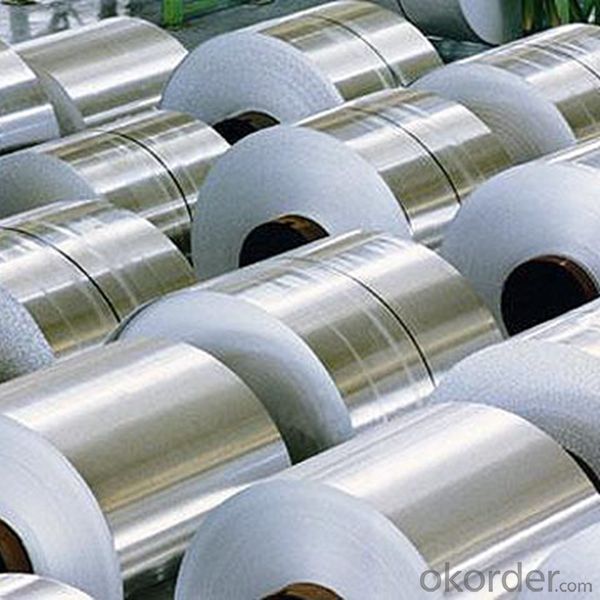
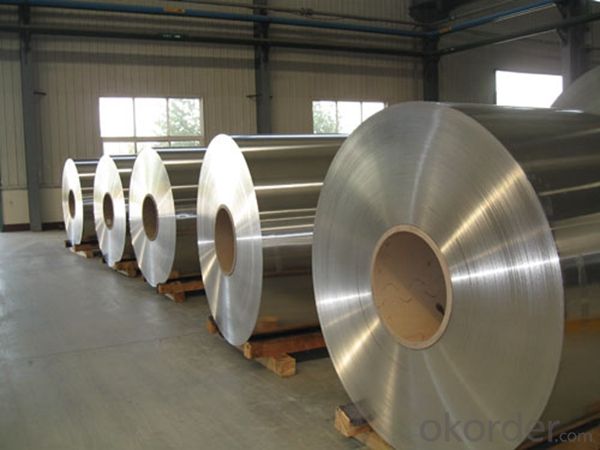
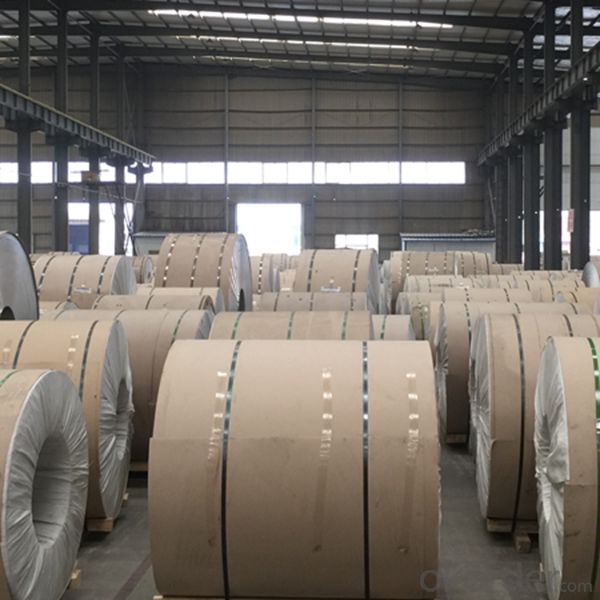
6. Package and shipping of Factory Direct Supply Mill Finish Aluminium Coil 1050 for Building
eye to wall
eye to the wall
with wood pallet (wooded case also available)
7. FAQ
1) What is the delivery time?
Dpends on actual order, around 20 to 35 days
2)What is the QC system:
We have QC staff of 20 persons and advanced equipment, each production is with MTC traced from Aluminum ingot lot.
3) What market do you mainly sell to?
Australia, America, Asia, Middle East, Western Europe, Africa etc
- Q: The canoe is aluminum. It has some paint remaining on it from what i am assuming is the original factory paint. The paint is just in patches, so my question is do i sand only where the paint is, or the whole canoe? Will sanding the aluminum damage it? Or should I not sand it at all, and just use paint stripper? After getting the old paint off, what kind of primer should i use? or is it not necessary to prime? What kind of paint should I use? I plan on it being multi tone(a leafy camo, of olive drab, flat black, and a gray tone).
- ...if you paint it black, it'll never tip.
- Q: Are there any limitations on the surface treatment of aluminum coils?
- Yes, there are limitations on the surface treatment of aluminum coils. One limitation is the type of surface treatment that can be applied to aluminum coils. Aluminum coils can be treated with various surface finishes such as anodizing, painting, and powder coating. However, not all surface treatments are suitable for all applications. For example, anodizing is a durable and corrosion-resistant finish, but it may not be suitable for applications that require a specific color or design. Similarly, painting and powder coating can provide a wide range of colors and aesthetics, but they may not provide the same level of durability as anodizing. Another limitation is the size and shape of the aluminum coils. Surface treatment processes may have limitations in terms of the size and shape of the aluminum coils that can be treated. For example, anodizing is typically done in tanks or racks, which may have size restrictions. Similarly, painting and powder coating processes may require specific equipment or facilities that may not be able to accommodate large or irregularly shaped coils. Additionally, the condition of the aluminum surface can also impact the effectiveness of the surface treatment. Aluminum coils may have imperfections or surface defects that can affect the adhesion and durability of the surface treatment. Proper cleaning and preparation of the aluminum surface are essential to ensure the effectiveness of the surface treatment. In summary, while there are various surface treatments available for aluminum coils, there are limitations in terms of the type of treatment that can be applied, the size and shape of the coils, and the condition of the aluminum surface. It is important to consider these limitations and select the most suitable surface treatment based on the specific requirements and constraints of the application.
- Q: Can aluminum coils be used for food processing conveyor systems?
- Yes, aluminum coils can be used for food processing conveyor systems. Aluminum is a popular choice for conveyor systems in the food processing industry due to its various beneficial properties. Firstly, aluminum is a lightweight material, which makes it easier to install and transport. This is particularly important for conveyor systems that may require frequent reconfiguration or relocation. Additionally, aluminum has excellent corrosion resistance, which is crucial in food processing environments where exposure to moisture, chemicals, and food particles is common. Furthermore, aluminum is a hygienic material that is easy to clean and maintain, ensuring food safety standards are met. Lastly, aluminum coils can be easily formed and customized to fit specific conveyor system requirements, allowing for efficient and effective food processing operations. Therefore, aluminum coils are a suitable choice for food processing conveyor systems.
- Q: Would an SS scribe scratch an aluminum plate? What is the hardness value of both metals?
- SS is much harder than aluminum and it would scratch an aluminum plate. Google the materials to get hardness values.
- Q: I am looking to bake some Buffalo wings and am wondering if it's alright to bake them in an aluminum pan (disposable or otherwise). I will be brushing/basting the chicken in the sauce not 'drowning' the chicken in it. I have heard that acidic sauces like Tomato sauce (less acidic than wing sauce) should not be cooked in aluminum (stovetop pans bakeware) because of some chemical interaction, but I've seen those big foil pans full of pasta spaghetti sauce at wedding, etc. Is the whole acid/aluminum thing true or an old cooking myth?
- I think it should be fine. Ive never heard that before. However aluminum conducts heat differently so it may change the end result. You might want to consider deep frying your wings. At the very least par boil them first so that you can get them crispy
- Q: Briefly describe the process of aluminum production from bauxite. Describe the electrolyte and write the anode and cathode half-reactions.
- Bauxite is purified by washing with sodium hydroxide and then seeding with dry ice. The purified aluminium oxide is then dissolved in molten cryolite at 900 degrees C (the electrolyte). It is electrolysed with grapite anodes and a graphite cathode that acts as the vessel for the reaction. Anode; 2 O2- - O2(g) + 4e Cathode: Al3+ + 3e - Al(l)
- Q: What is the purpose or use of aluminum coil in various applications?
- <p>Aluminum coil is a versatile material used in a wide range of applications due to its properties such as lightweight, corrosion resistance, and high thermal and electrical conductivity. It is commonly used in construction for roofing and siding, in the manufacturing of heat exchangers and radiators, and in electrical applications like transformers and power lines. Aluminum coil is also utilized in packaging, such as food and beverage cans, and in automotive and aerospace industries for lightweight components. Its malleability allows it to be easily shaped and formed, making it an ideal material for various industrial processes.</p>
- Q: How does the gauge of aluminum coils affect their performance?
- The thickness of the aluminum sheet used to make the coil determines the gauge of aluminum coils. The gauge is typically measured by its thickness, with a smaller gauge indicating a thicker sheet. The performance of aluminum coils is significantly influenced by their gauge. To begin with, the strength and durability of the aluminum coil are affected by the gauge. Thicker gauges offer greater strength and resistance to bending or warping, making them suitable for applications that require sturdy and long-lasting coils. Conversely, thinner gauges are more flexible but may be prone to damage or deformation, making them suitable for less demanding applications. Furthermore, the gauge affects the thermal conductivity of the aluminum coil. Thicker gauges have lower thermal conductivity, resulting in slower heating or cooling. This characteristic can be advantageous in applications where precise temperature control is crucial, as it helps maintain a stable environment. On the other hand, thinner gauges have higher thermal conductivity, enabling faster heat transfer. This can be beneficial in applications that require rapid heating or cooling. Moreover, the gauge affects the weight and cost of the aluminum coil. Thicker gauges are heavier and generally more expensive due to the increased amount of material required. This factor is important to consider in applications where weight or cost plays a significant role. Thinner gauges, being lighter and less expensive, are more suitable for applications that prioritize weight reduction or cost efficiency. Lastly, the gauge influences the ease of fabrication and formability of the aluminum coil. Thinner gauges are more easily bent, shaped, or formed into desired configurations, making them suitable for applications that involve intricate or complex designs. Although thicker gauges are less malleable, they can still be formed with specialized equipment or processes. In conclusion, the gauge of aluminum coils directly affects their performance. It influences their strength, durability, thermal conductivity, weight, cost, and formability. Therefore, selecting the appropriate gauge for a specific application is crucial to ensure optimal performance and efficiency.
- Q: The user is asking if it's possible to purchase recycled aluminum coil through online platforms.
- <p>Yes, you can buy recycled aluminum coil online. Many online marketplaces and specialized metal supply websites offer a variety of aluminum coils, including recycled ones. You can search for suppliers on platforms like Alibaba, Amazon, or industry-specific B2B websites. Be sure to check the supplier's reputation, the quality of the recycled aluminum, and the specifications to ensure it meets your requirements.</p>
- Q: 94 f150. have the stock wheels which are weathered and dull. whats a good way to bring the shine back? some of the original coating is there ,most is gone. tried mothers aluminum wheel polish,does nothing. is it wise to use a wire wheel in a drill to get down to just the aluminum? the wheels are those with the center plastic cap with holes around the outer edge.thanks for any info
- Get a couple of those Mothers power balls .If the clear coat is coming off Then dirt is embedded in the rim The best way is to have them polished by a pro .If thats not the route you want to go ,the power ball is about the only thing that can help you out and for much cheaper than having a pro do it .Not to mention doing it by hand just sucks .But it would take two at least to do all 4 wheels Then the polish will do what its advertised to do or use any polish you want You will need to at least remove the wheel off the truck for the best results If you strip the rims or use acidic cleaners to remove the remaining clear coat It may take more materials Like polish ,Pads,or the power ball thing Cause it will leave a raw aluminum surface which usually requires more time and labor to polish out DON'T WIRE WHEEL THE RIMS OKAY YOU WILL SCRATCH THEM SO DEEP YOU WILL RUIN THEM NO ABRASIVE MATERIALS ARE TO BE USED ON A ALUMINUM RIM NOT EVEN A WIRE WHEEL OF ANY TYPE OR MATERIAL SHOULD BE USED ON THE RIM what you'll do is make them uglier Cause pitting strip the surface leaving a porous and uneven surface Which corrosion likes to form on .Thats the worst and the wrong way to clean aluminum and even steel sometimes depending on what it is But NEVER aluminum
Send your message to us
Coil Coating Aluminum Factory Direct Supply Mill Finish Aluminum Coil 1050 for Building
- Loading Port:
- Shanghai
- Payment Terms:
- TT OR LC
- Min Order Qty:
- 5 m.t.
- Supply Capability:
- 10000 m.t./month
OKorder Service Pledge
OKorder Financial Service
Similar products
Hot products
Hot Searches
Related keywords
